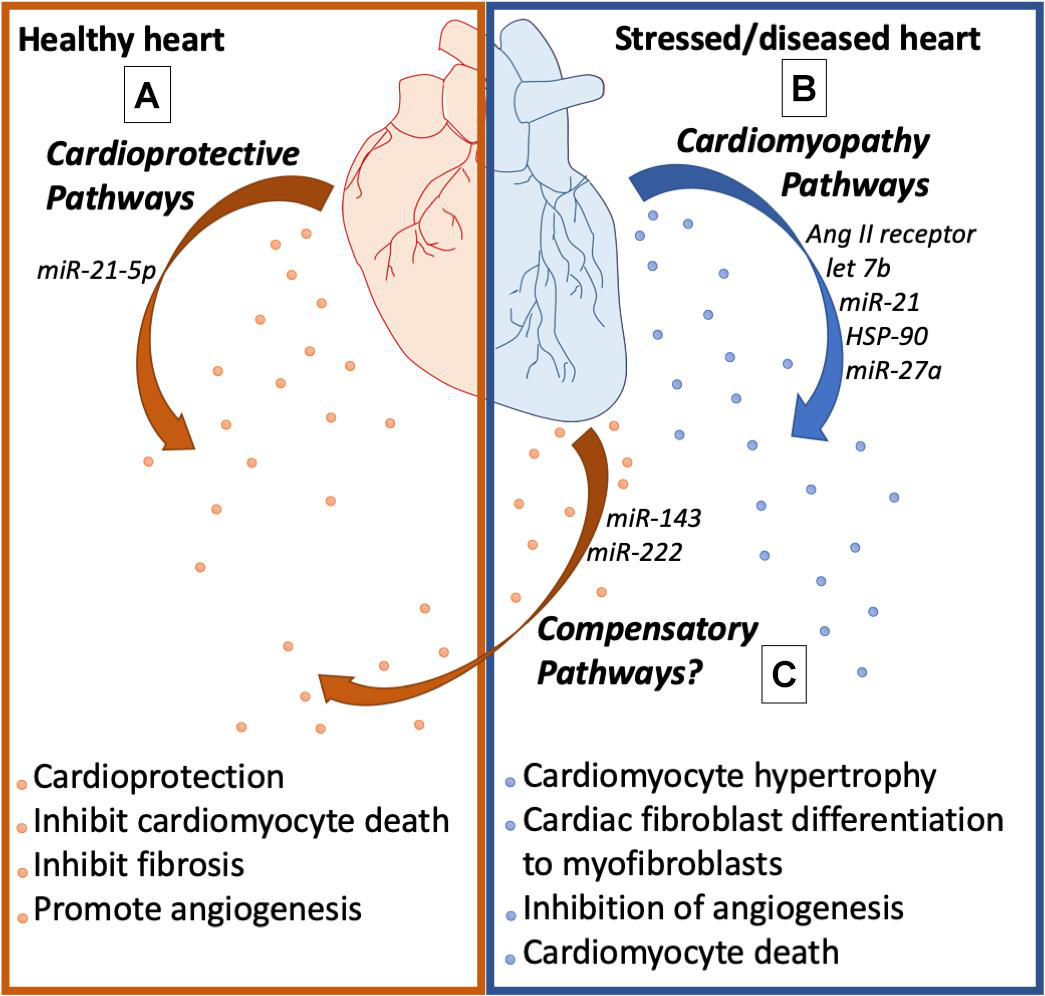Heart Tissue Exosome Research and Application
As the central organ regulating systemic circulation, the heart comprises a complex cellular network—including cardiomyocytes, cardiac endothelial cells, and fibroblasts—that maintains structural and functional homeostasis via dynamic intercellular communication. Heart tissue exosomes are nanoscale vesicles secreted by these cells under physiological or pathological conditions, carrying molecular signals such as miRNAs, proteins, lipids, and metabolites. These exosomes play critical roles in cardioprotection, fibrosis modulation, angiogenesis, and apoptosis regulation.
In disease states—such as cardiac hypertrophy, ischemia-reperfusion injury, or myocarditis—heart tissue exosomes exhibit specific changes in their cargo, either contributing to disease progression or activating compensatory responses. For instance, exosomes from healthy heart tissue enriched with miR-21-5p can inhibit apoptosis, reduce fibrosis, and promote angiogenesis. Conversely, under pathological stress, exosomes may carry molecules such as Ang II receptor, miR-27a, or HSP-90, activating maladaptive cardiac signaling or compensatory mechanisms driven by miR-143/miR-222.

Patil, M. et al. Front. Cell Dev. Biol. 2019.
MtoZ Biolabs provides a one-stop solution for Heart Tissue Exosome Research and Application by leveraging extensive expertise in both exosome biology and cardiovascular sample processing, empowering researchers to decode molecular communication in cardiac health and disease.
Analysis Workflow
To ensure high purity, integrity, and reproducibility of exosomes derived from heart tissue, MtoZ Biolabs has established a comprehensive analytical workflow that spans from sample preparation to functional interpretation:
1. Tissue Preprocessing: Low-temperature homogenization or in situ enzymatic digestion is used to efficiently release interstitial exosomes while minimizing contamination from free cells or debris.
2. Exosome Isolation and Purification: A combination of differential centrifugation, density gradient ultracentrifugation, and nanofiltration ensures acquisition of intact and high-purity vesicles.
3. Physicochemical Characterization: Exosomes are validated through nanoparticle tracking analysis (NTA), transmission electron microscopy (TEM), and detection of canonical markers (CD9, CD63, TSG101) via immunoblotting.
4. Multi-Omics Profiling: Deep molecular analysis includes proteomics, miRNA/lncRNA sequencing, lipidomics, and metabolomics to uncover the regulatory networks embedded in exosomes.
5. Functional Prediction and Mechanism Analysis: Integrated bioinformatics is applied to identify enriched pathways, predict target cells or genes, and explore disease associations, facilitating hypothesis validation and translational insight.
Service Advantages
MtoZ Biolabs offers high-precision and efficient support for Heart Tissue Exosome Research and Application. Our key service advantages include:
1. Tissue-Specific Extraction Optimization
Tailored protocols accommodate the dense, heterogeneous structure of myocardial tissue using low-disruption digestion and high-efficiency purification.
2. Integrated Multi-Omics Capabilities
High-throughput platforms combined with advanced bioinformatics pipelines address both fundamental and translational research needs.
3. Cross-Species Compatibility
We support human, mouse, pig, and other heart tissue samples, ideal for both clinical studies and animal model-based research.
4. Project-Level Customization
From experimental planning to data generation, visualization, and interpretation, our dedicated scientific team delivers personalized, end-to-end support.
5. One-Time-Charge
Our pricing is transparent, no hidden fees or additional costs.
Applications
Heart Tissue Exosome Research and Application has become a powerful tool in cardiovascular research, with demonstrated value in the following areas:
✔ Mechanism Studies and Early Diagnosis of Ischemic Heart Disease: Profiling exosomal miRNA changes in infarcted regions to understand their roles in damage and repair signaling.
✔ Biomarker Discovery in Heart Failure: Identifying stably expressed metabolites and non-coding RNAs in exosomes for prognostic assessment and treatment monitoring.
✔ Fibrosis Modulation: Investigating exosome-mediated communication between cardiomyocytes and fibroblasts to map fibrosis development and reversal.
✔ Regenerative and Therapeutic Strategies: Evaluating the therapeutic potential of heart tissue exosomes in stem cell-based repair and guiding the development of exosome-based therapies.
FAQ
Q1: What are the advantages of heart tissue exosomes compared to plasma- or culture-derived exosomes?
A1: Heart tissue exosomes originate from the local pathological microenvironment, providing more specific and relevant molecular information. They are particularly suited for early disease mechanism studies, therapeutic target discovery, and tissue repair research. MtoZ Biolabs offers a one-stop workflow including tissue acquisition, exosome isolation, and functional validation.
Q2: Is it difficult to obtain high-purity exosomes from heart tissue?
A2: Yes, due to the presence of abundant muscle fibers and extracellular matrix. Our optimized protocol integrates in situ enzymatic digestion with sequential differential and density-gradient centrifugation, ensuring structurally intact, source-specific, and highly purified heart tissue exosome.
Q3: Are heart tissue exosomes suitable for transcriptomic or proteomic studies?
A3: Absolutely. These exosomes are rich in stable miRNAs, lncRNAs, and proteins, making them excellent samples for transcriptomic and proteomic analyses. MtoZ Biolabs provides high-sensitivity, high-throughput data acquisition and interpretation services to support research publication and project applications.
Q4: Can exosomes be extracted from heart tissue in animal models?
A4: Yes. We support exosome extraction and analysis from heart tissues of mice, rats, pigs, and other animal models, enabling mechanistic studies and target validation in cardiovascular research.
Heart Tissue Exosome Research and Application offers a frontier platform for investigating cardiovascular disease mechanisms and developing precision diagnostic and therapeutic strategies. MtoZ Biolabs combines cutting-edge technology, in-depth research experience, and high-quality data generation to facilitate the translation of heart tissue exosome studies from bench to bedside.
To learn more about our customized services, please contact the MtoZ Biolabs expert team—we are ready to provide comprehensive solutions tailored to your research goals in Heart Tissue Exosome Research and Application.
How to order?







